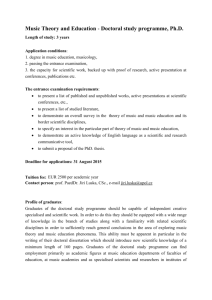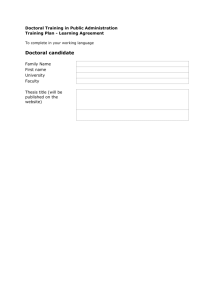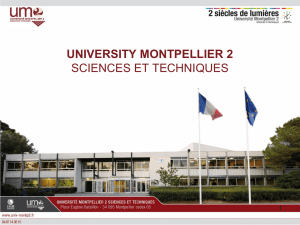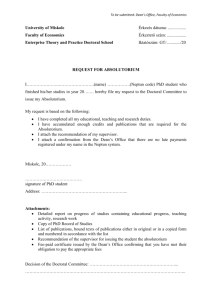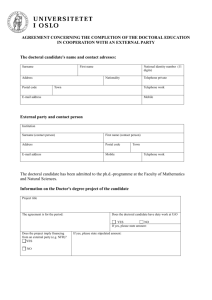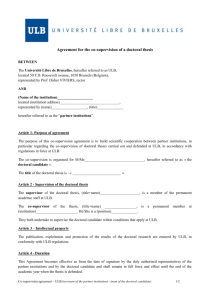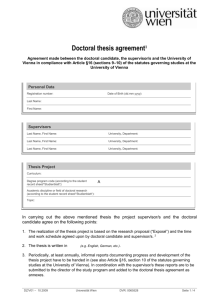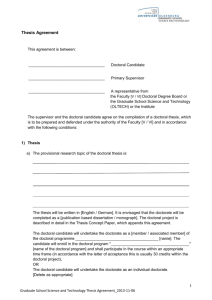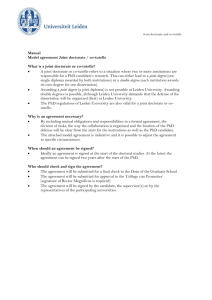Doctoral Candidate Needs Analysis
advertisement
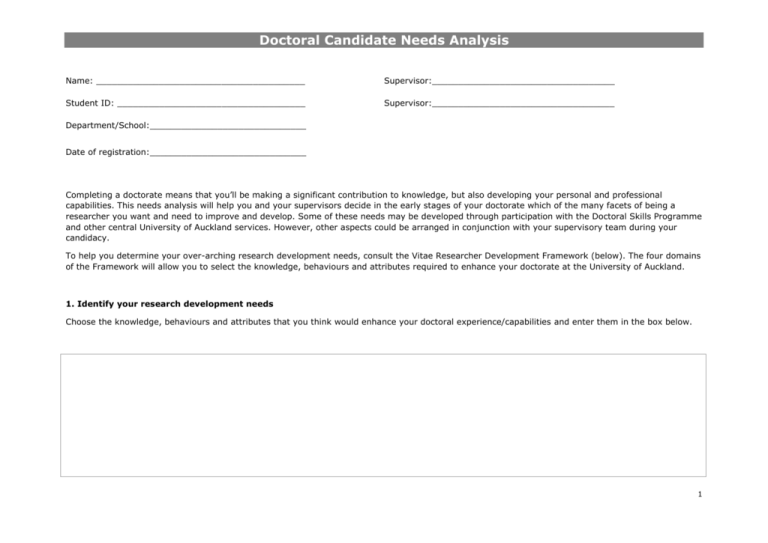
Doctoral Candidate Needs Analysis Name: ________________________________________ Supervisor:___________________________________ Student ID: ____________________________________ Supervisor:___________________________________ Department/School:______________________________ Date of registration:______________________________ Completing a doctorate means that you’ll be making a significant contribution to knowledge, but also developing your personal and professional capabilities. This needs analysis will help you and your supervisors decide in the early stages of your doctorate which of the many facets of being a researcher you want and need to improve and develop. Some of these needs may be developed through participation with the Doctoral Skills Programme and other central University of Auckland services. However, other aspects could be arranged in conjunction with your supervisory team during your candidacy. To help you determine your over-arching research development needs, consult the Vitae Researcher Development Framework (below). The four domains of the Framework will allow you to select the knowledge, behaviours and attributes required to enhance your doctorate at the University of Auckland. 1. Identify your research development needs Choose the knowledge, behaviours and attributes that you think would enhance your doctoral experience/capabilities and enter them in the box below. 1 Doctoral Candidate Needs Analysis Vitae Researcher Development Framework: Knowledge, behaviours and attributes www.vitae.ac.uk/rdf 2 Doctoral Candidate Needs Analysis 2. Explore the Doctoral Skills Programme The Doctoral Skills Programme offers a variety of workshops to support and assist doctoral candidates in two ways: to help further develop the academic and professional skills needed to complete a doctorate successfully and in a timely manner; and to help with career planning and professional development. Explore how the Doctoral Skills Programme can meet your research development needs by using the grid below. (A) Knowledge and intellectual abilities o Kn Induction Day Academic integrity Managing your references - Refworks Academic writing Thesis proposals Thesis structure Getting started with writing Writing for publication What examiners expect Literature review Getting started Organising and writing Targeting your research and staying current Tracking citations IT skills Big data and high-performance computing Formatting your thesis Personal & professional development Taking control of your thesis Perfecting your network skills Maximise the impact of your research outputs Commercialising new knowledge Writing your non-academic CV Presenting research At seminars, events and conferences With academic posters ge ed wl se ba ve iti gn Co • • ie ilit ab s (B) Personal effectiveness (D) Engagement, influence and impact t t s d d rs ct er ct ity ie en en a n on an pa he re lit du m m tiv g ot ca n t im ua ion ati ge ge on ea in ces t q h c r e d a a d d t n a l n C n ic mi al an an wi un ur pm na la ta e m m on g un , f eso io na elo rs in m diss lfen r ce ss ch k i o ev r n r m e m Pe s Se f a a o d o ge es Co se W Pr F in of ga Re Pr En • • • • • • • • • • • • • • • • • • • • • • • • • • • • • • • • • • • • • • • • • • • • • • • (C) Research governance and organisation • • • • • • • • • • • • • • • • • • • • • • 3 Doctoral Candidate Needs Analysis 3. Explore other researcher development opportunities In addition to the Doctoral Skills Programme, the University of Auckland offers you plenty of developmental opportunities, most of which are free of charge. We suggest you also explore these opportunities by following the links below to see what’s already on offer to you as a doctoral candidate. Careers and Employment Services IT Training Doctoral Academic Leadership Initiative Teaching development Personal and professional development 4. Meet with your supervisors to discuss development needs Meet with your supervisors to discuss your needs analysis and the training opportunities you would like to pursue, and come up with a plan of action. Completing this plan is one of your provisional-year goals. 4 Doctoral Candidate Needs Analysis 5. Record your developmental plan Development area (e.g. Professional and career management (B3)) Proposed activity and expected completion Central University of Auckland Supervisor/Department/School/Faculty or provided activity externally provided training (e.g. application for Doctoral Academic Leadership Initiative - second year, Scoping internship options – end of provisional year) (e.g. training on laboratory equipment, questionnaire design, fieldwork, finding a mentor to help develop your teaching skills etc.) (A) Knowledge and intellectual abilities (B) Personal effectiveness (C) Research governance and organisation (D) Engagement, influence and impact Signed: ____________________________ (Candidate) Signed: ______________________________ (Supervisor) Date: ________________ Signed: ______________________________ (Supervisor) 5


